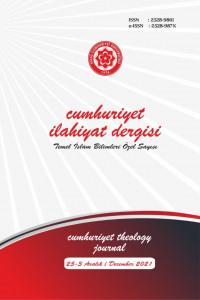Zarûretin Bazı Haramları İbâhasının Keyfiyeti ve Nihâî Sebepleri
The Way and the Ultimate Causes of Allowing to Some Prohibitions Because of the Necessity
Author(s): Ayşegül YilmazSubject(s): Theology and Religion, Islam studies, Philosophy of Religion, Philosophy of Law, Sharia Law
Published by: Cumhuriyet Üniversitesi İlahyat Fakültesi
Keywords: Islamic Law; Necessity; Prohibition; Permissible; Mercy;
Summary/Abstract: One of the most important issues in Islamic law is that either partially or completely, or temporary or permanently, a rule can be changed for a particular group of people or everyone. Since the concept of necessity can lead to a change of an important rule like ḥarām/prohibition, this concept should be examined meticulously both in theory and in practice. The thşs study aims to analyze how and why necessities make some ḥarāms permissible and to reveal the ultimate cause for this ibāḥa (permission) from the point of view of Islamic legal theory and philosophy. To achieve this aim, first, the nature of the relationship between the prohibition and the act is examined. To understand how and why necessity gives permission to some ḥarāms, it is necessary to determine the changing and unchanging elements in the case at issue. In the case of necessity, there is no change in the nature of the act and the evil, which is considered as the reason of banning. Indeed, there is a change in the conditions surrounding the act and in the state of the obligated person. However, the main factor that enables the change in ḥarām is the change in the addressing of Shāri‘, who takes into account the changes mentioned. It is seen that the changes stemming from necessity do not lead to the same results as in all permitted ḥarāms. This observation requires a thourgh examination and elaboration on what the scholars of legal theory mean by abolition of prohibition and turning it into permissible. As a result, it has been observed that permitted ḥarāms do not equally function in terms of turning into permissible and that they do not have an equal effect on other acts in the field of mubāḥ. In that case, it is possible to evaluate the permitted ḥarām acts as al-maʻfuw ʻanh/forgiven acts. Although the act could be considered part of the category of mubāḥ, it would be more correct to place them close to the line of makrūh. From the point of view of the servant, the reason why necessity makes a ḥarām act permissible is the priority of avoiding greater evil. However, to reveal His sincere servants, Allah's command to them to avoid all ḥarāms even if they die, does not contradict with His wisdom. For this reason, the ultimate cause why Allah considers the case of necessity in passing judgment is His endless mercy. All these points helped reaching some broader conclusions about legal theory, as well as some conclusions specific to the case of necessity. It turns out that to understand how necessity makes some ḥarāms permissible, one needs to comprehend the relation between the act, the obligated person, the conditions surrounding them and the Shari‘ correctly. Understanding this relationship well is also extremely important to understand the theory of ruling and the Islamic legal theory. This research has substantiated once again that the issues addressed by the Islamic legal theory and practice are linked to the theological doctrines, more than, it is commonly perceived or considered. It turns out that it is important to know the deep or subtle differences between the terms such as ḥarām-ḥalāl, maḥẓūr-ḥarām, mubāḥḥalāl, fundamental mubāḥ-ma‘fuw ‘anh, etc. as well as grasping each of the rule categories. Comprehending all these concepts constitutes an important step in acquiring a true understanding of religion and the maqāṣid al-sharī‘a. In this research, it has been proven once again that each category of the rule includes different levels of ruling in itself. The reason why the acts are categorized in different levels even if they are in the same rule category is the concepts of worldly and otherworldly; evil or good arising from the the ḥarām act. This study also confirmed that the obligated person is at the center of the law. This fact reveals how difficult it is to argue that the rules of Allah are based on divine will that is independent of and disregards the act, obligated person, and conditions. On the contrary, it is understood that the interests of the servant are considered both in the rules of necessity and in the whole of the divine legislation (and even the genesis). On the other hand, this indicates a legal system that is not inflexible and dull, but rather dynamic and parallel to life. Both the fact that the real and absolute source of the rule is Shāri‘ Almighty,and that a very large area of legislative was left to the mujtahid should be considered together. This truth has been observed once again in the matter of making prohibitions permissible on the basis of necessity, and the task of determining which evil is greater was often left to the mujtahid’s consideration.
Journal: Cumhuriyet İlahiyat Dergisi
- Issue Year: 25/2021
- Issue No: 3
- Page Range: 1421-1441
- Page Count: 21
- Language: Turkish

